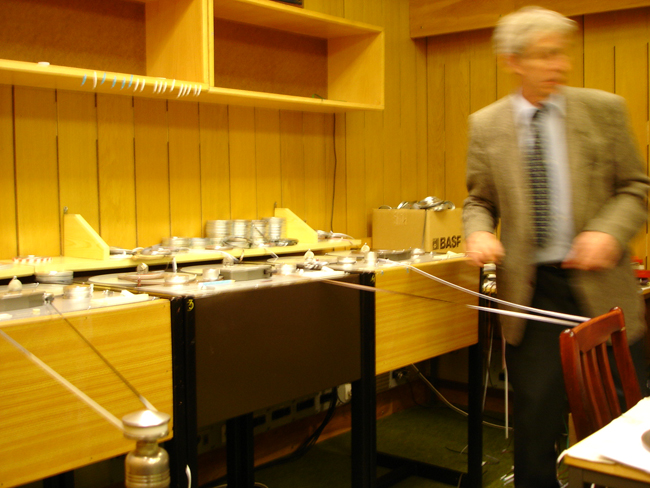EUGENIUSZ RUDNIK
Regarding my occasional, and short, meetings with the master above masters, Karlheinz Stockhausen, in Cologne. I happened an adventure viz., he was making then Telemusik, preparing its performance in 1967. I came into the studio where he was working. There was a couple of engineers standing by him, dressed in suits and snow-white protective aprons. They were struggling with a problem. They were using a radio receiver and wanted to get signal out of short waves as a source to transform other sound, but did not want the sound coming out of the speaker, as it was disturbing the composer who couldn’t concentrate. I came in and he asked me: “Mr. Rudnik, maybe you could help?”.
The receiver was facing the wall and the back cover was removed. If I may say so, the group of engineers couldn’t cope with it. I had just bought myself a beautiful pair of pliers–a tool used to cut wires–and I just happened to have them on me. I approached the receiver and cut off two thin wires connected to the speaker. It simply resulted in turning off the speaker. It was a shock to all of them, none of the Germans would have ever come up to such idea. According to them, if something was once constructed it had to be deconstructed and not with the use of scissors.
After this performance, which I regard as a prefiguration of the Polish saying Polak potrafi (can-do Poles), or at least a performance fitting of the saying, first occurred in the 70s, Karlheinz Stockhausen then said, “Good then, you will work with me. We are going to Spain next week and I warn you that they have 60Hz in their power network.” He asked, “What is your family like?”–Well, like this and like that–“In that case please phone up Dr. Tomek (the chief of contemporary music), to find you an apartment here and you will work with me”.

Regarding didactics, I have been given the chance to teach at least four outstanding students, which was… the greatest total failure of my life. One female student, a university graduate, married a plumber, is a mother of four and lives in Paris. The second genius student did not get a pass in Russian language and was expelled as a result. The third one, a versatile musician, plays sax Tango Milonga in a motel in Wyszków, truth… and then there was one more absolutely talented woman. She now works in an accounting department. As far as I am concerned I have suffered from a sufficient number of failures and have therefore decided to save the world from one more type of failure.

Photos by Boleslaw Blaszczyk
—
Eugeniusz Rudnik was born in 1932, in Nadkole, Poland. He is a composer and pioneer of electronic and electroacoustic music. He was the first engineer of electroacoustic music in Poland, from 1955 associated with Polish Radio. Between 1967 and 1968 Rudnik worked in the Studio for Electronic Music of the Westdeutscher Rundfunk in Cologne, where he cooperated with Włodzimierz Kotoński on implementation of Klangspiele. While in Cologne, Rudnik also worked with Karlheinz Stockhausen and Peter Kotik. As a composer he has created about 95 works, in electronic music studios in Warsaw, Stockholm, Cologne, Paris, Bourges, Baden-Baden, Brussels and Ghent.
